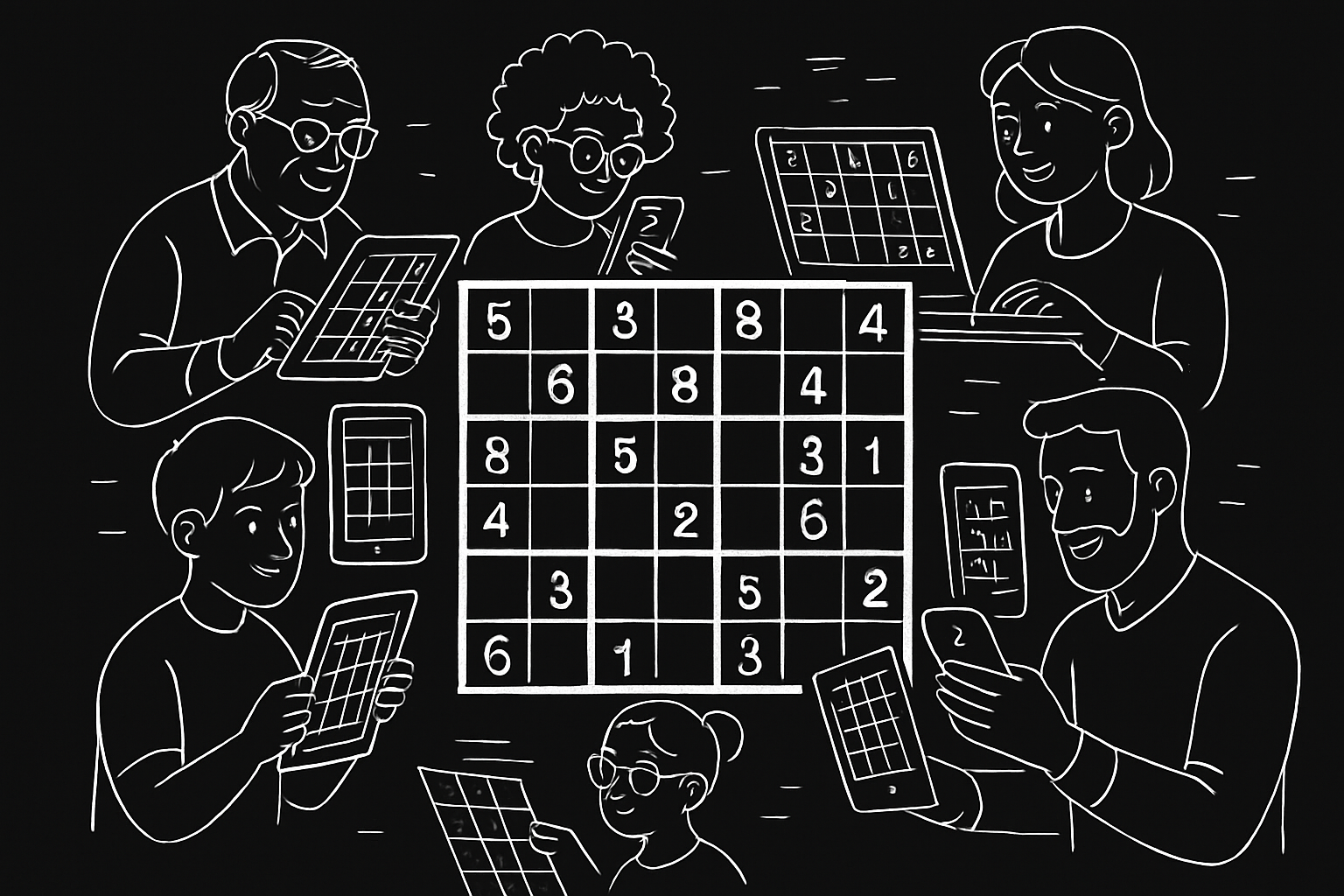Ready to unlock the secrets of Sudoku mastery? Whether you’ve never solved a puzzle or aim to become a sudoku expert, you’re in the right place.
This guide is designed for beginners who want to level up fast. We’ll break down the basics, reveal step-by-step strategies, and share insider tips trusted by experts in 2025.
Discover why Sudoku captivates millions worldwide, learn how to boost your skills, and map out your path to expert status. Let’s dive in and start your journey toward sudoku expert success!
Understanding Sudoku: The Basics and Beyond
Unlocking the world of Sudoku means stepping into a puzzle tradition with a fascinating backstory. What began as a number puzzle in the 18th century evolved into the global phenomenon we know today. Early forms appeared in French newspapers before the modern 9×9 grid emerged in Japan. Now, Sudoku is played everywhere, from printed newspapers to mobile apps. Over 200 million Sudoku puzzles are solved online each year, showing just how widespread the sudoku expert community has become.
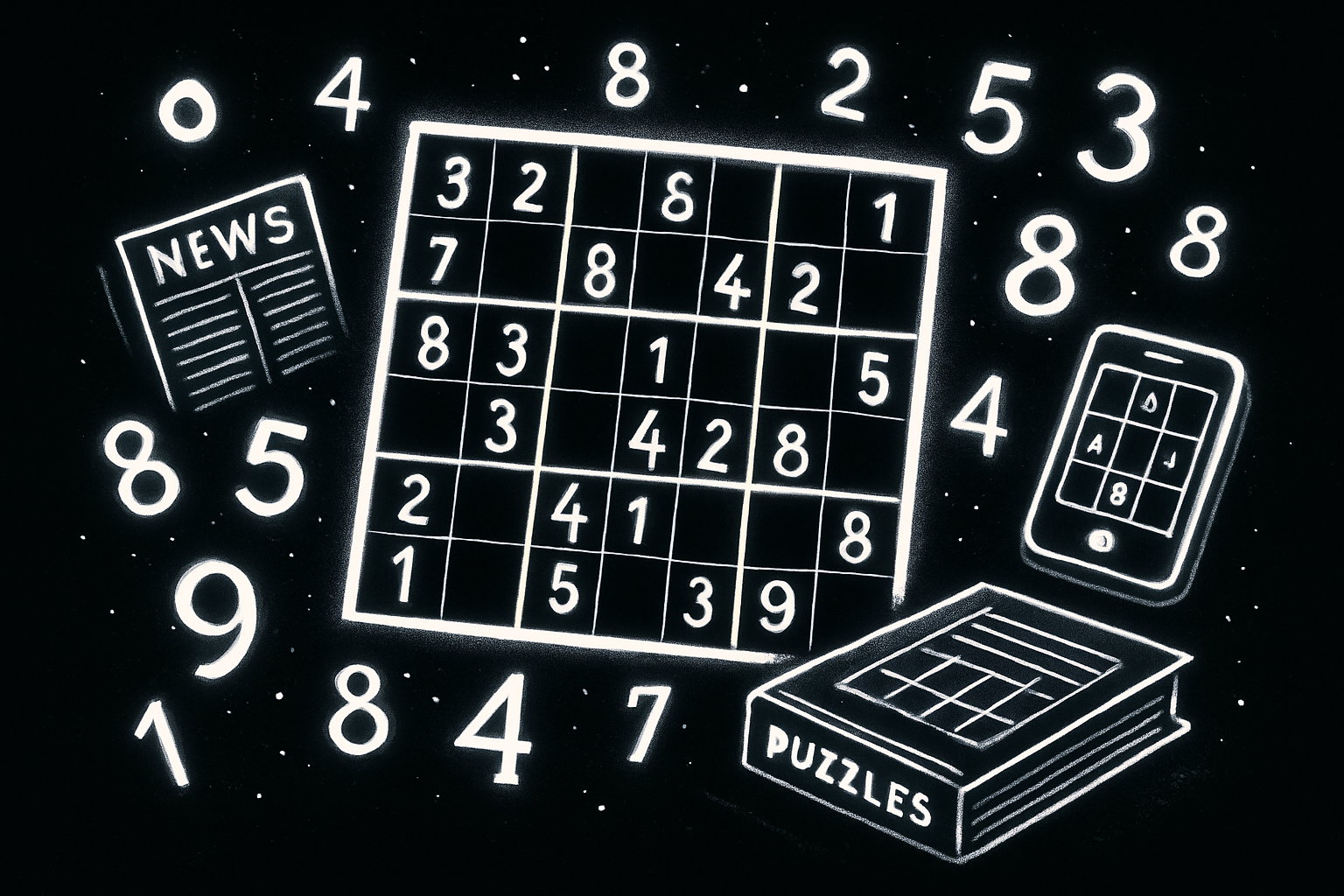
The Origin and Evolution of Sudoku
Sudoku's roots trace back to Latin Squares, a concept developed in the 1700s. Its transformation into the recognizable 9×9 format happened in Japan during the 1980s, where the name “Sudoku” originated. The puzzle gained traction in Western countries in the early 2000s, exploding in popularity thanks to newspaper syndication and, later, digital platforms. Today, sudoku expert enthusiasts can access an endless supply of puzzles online or offline.
Core Rules and Structure of Sudoku
At its core, Sudoku challenges your logic within a 9×9 grid. The grid is divided into nine 3×3 boxes. Each row, column, and box must contain the numbers 1 through 9, with no repeats. To solve, start by scanning for rows or boxes with the most numbers filled in. For example, if a box is missing only one number, fill it in first. Every sudoku expert learns these basics before diving into tougher puzzles.
- Each row, column, and box: 1–9, no repeats
- Start with the easiest placements
- Use pencil marks for possible options
Types and Levels of Sudoku Puzzles
Sudoku comes in many flavors. Classic Sudoku is the most common, but there are also Killer, Hyper, and Samurai Sudoku, each introducing unique twists. Difficulty levels range from Easy to Expert, often rated by the number of starting clues and logic required. According to puzzle community surveys, 60% of beginners prefer Classic Sudoku, while more advanced sudoku expert players seek out challenging variants for extra brainpower.
| Type | Description | Difficulty Range |
|---|---|---|
| Classic | Standard 9×9 grid | Easy–Expert |
| Killer | Cages with sum clues | Medium–Expert |
| Hyper | Overlapping regions | Hard–Expert |
| Samurai | Multiple grids combined | Expert |
Why Sudoku is the Ultimate Brain Workout
Solving Sudoku is more than just fun—it’s a proven way to boost your brainpower. Regular play improves memory, logic, and focus. Studies even link frequent Sudoku solving to slower cognitive decline in older adults. If you’re aiming to become a sudoku expert, these brain benefits are a fantastic bonus. For a deeper dive into how Sudoku sharpens your mind, check out The Cognitive Benefits of Sudoku.
- Enhances logical thinking
- Improves concentration
- Supports long-term memory
The Rise of Online Sudoku Platforms
Since 2020, Sudoku has surged on web and app-based platforms. Global lockdowns led to a spike in downloads and online play, with sudoku expert hopefuls flocking to digital puzzles for daily brain exercise. Many apps now offer features like hints, timers, and leaderboards, creating a vibrant online community. Whether you prefer solving on your phone or computer, there’s a platform to fit your lifestyle.
Common Misconceptions About Sudoku
Many people think you need to be a math genius to become a sudoku expert. That’s simply not true. Sudoku is a logic puzzle—no math beyond counting is needed. Another myth is that expert-level puzzles are impossible for beginners. In reality, anyone can progress with practice and the right strategies. Don’t let these misconceptions stop you from enjoying the game or reaching sudoku expert status.
Step-by-Step Guide: How to Progress from Beginner to Sudoku Expert
Embarking on your journey to become a sudoku expert means mastering a series of logical steps, each building upon the last. Whether you're new to puzzles or aiming to sharpen your skills, this guide breaks down the essential path from novice to pro. Let’s dive into clear, actionable strategies that will level up your game.
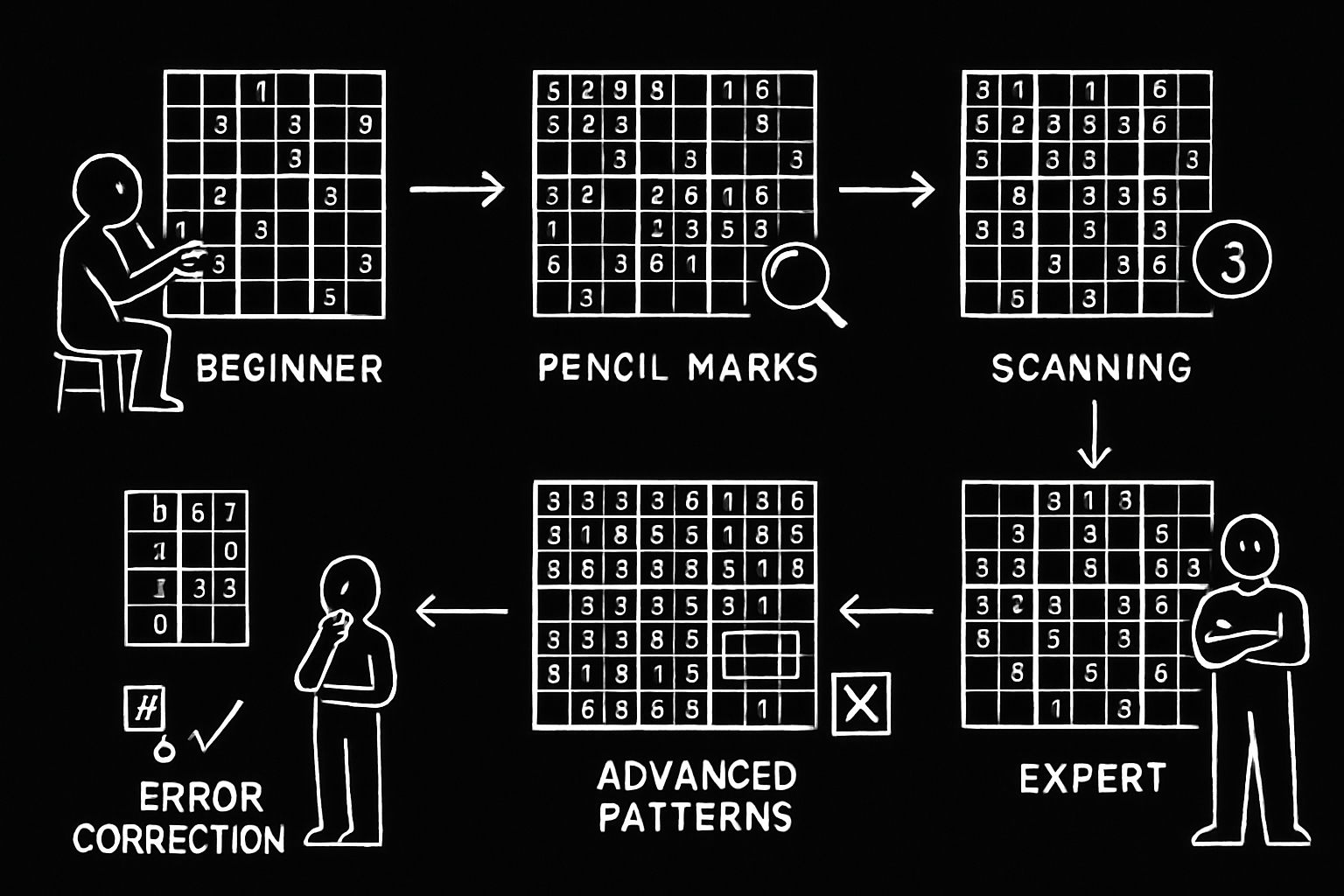
Step 1: Mastering the Basics
Every sudoku expert starts with the fundamentals. The 9×9 grid might seem daunting, but understanding basic notation and pencil marks is essential. Use light pencil marks to jot possible numbers in empty cells. This helps you visualize options without committing.
Next, practice scanning techniques. Look across rows, columns, and boxes to spot missing numbers. Start by filling in cells where only one number fits. For example:
If a row lacks the number 5 and only one cell is empty, that cell must be 5.
Focus on easy wins first. Solving these cells builds momentum and confidence. The more you practice these basics, the more naturally you’ll spot patterns. With patience, you’ll lay the groundwork needed for your sudoku expert journey.
Step 2: Building Your Logical Reasoning
To become a sudoku expert, logical reasoning is your best friend. Begin by eliminating impossible numbers from each cell. Check which numbers already appear in the same row, column, or 3×3 box. Cross-hatching is a helpful visual approach: scan across rows and columns to see where a number can or cannot go.
Try counting techniques. For each digit, count how many times it appears in each section. If a digit is missing in a box, look at intersecting rows and columns to narrow down possibilities.
Let’s apply this to a medium puzzle. Imagine you need to place a 7 in a box. If 7 already appears in the same row and column elsewhere, only one position remains. These logical deductions are the building blocks for advancing as a sudoku expert.
Step 3: Advancing to Intermediate Techniques
Now, let’s step up your game with intermediate strategies. One powerful tool is the naked pair. If two cells in a row, column, or box contain only the same two candidates, other cells in that area cannot have those numbers.
Hidden pairs and triples are similar, but the candidates are “hidden” among other possibilities. Pointing pairs help you eliminate candidates from rows or columns outside a 3×3 box.
Box-line reduction is another handy trick. If a candidate appears only in one row or column within a box, it can be eliminated from the rest of that row or column outside the box.
For instance, applying naked pairs can quickly reduce clutter and clarify options, moving you closer to sudoku expert status.
Step 4: Expert-Level Strategies
Ready to unlock the techniques that define a sudoku expert? Advanced solving involves pattern recognition and sophisticated logic. The X-Wing method looks for identical candidates in two rows and two columns, allowing you to eliminate those numbers elsewhere.
Swordfish is a step up, involving three rows and columns. Forcing chains and coloring methods help resolve even the toughest puzzles by tracking logical consequences.
Did you know only 15% of players use X-Wing regularly, according to sudoku forums? For those interested in the cutting edge, research like Evaluating SAT and SMT Solvers on Large-Scale Sudoku Puzzles explores how modern algorithms tackle the hardest challenges—an inspiration for any aspiring sudoku expert.
Step 5: Practicing with Increasing Difficulty
Consistent practice is what transforms a beginner into a sudoku expert. Start with easy puzzles to build confidence, then gradually increase the difficulty. Track your progress and record your solve times to monitor improvement.
Consider using a simple table to log your journey:
| Difficulty | Average Solve Time | Notes |
|---|---|---|
| Easy | 10 mins | Quick wins |
| Medium | 20 mins | Practice logic |
| Hard | 30 mins | Use advanced methods |
| Expert | 30+ mins | Test all skills |
Challenge yourself to solve harder puzzles as you grow. Moving from 10-minute easy grids to 30-minute expert puzzles is a clear sign you’re on the path to becoming a sudoku expert.
Step 6: Troubleshooting and Error Correction
Even a sudoku expert makes mistakes. The key is learning to spot and fix them. Common errors include misplacing numbers or overlooking simple logic. Always double-check rows, columns, and boxes before making a move.
If you hit a dead end, backtrack to your last correct step. Don’t be afraid to erase and rethink. Avoid repeated errors by reviewing your completed puzzles and noting what tripped you up.
Data shows 70% of beginners make placement errors in their first 20 puzzles. As a sudoku expert, developing a habit of reviewing and correcting your work is crucial. With every corrected mistake, your skills sharpen, and your confidence grows as a true sudoku expert.
Essential Tools and Resources for Sudoku Mastery
Leveling up as a sudoku expert is much easier with the right tools at your fingertips. Whether you prefer solving on your phone, with pen and paper, or learning from others, there’s a resource for every style.
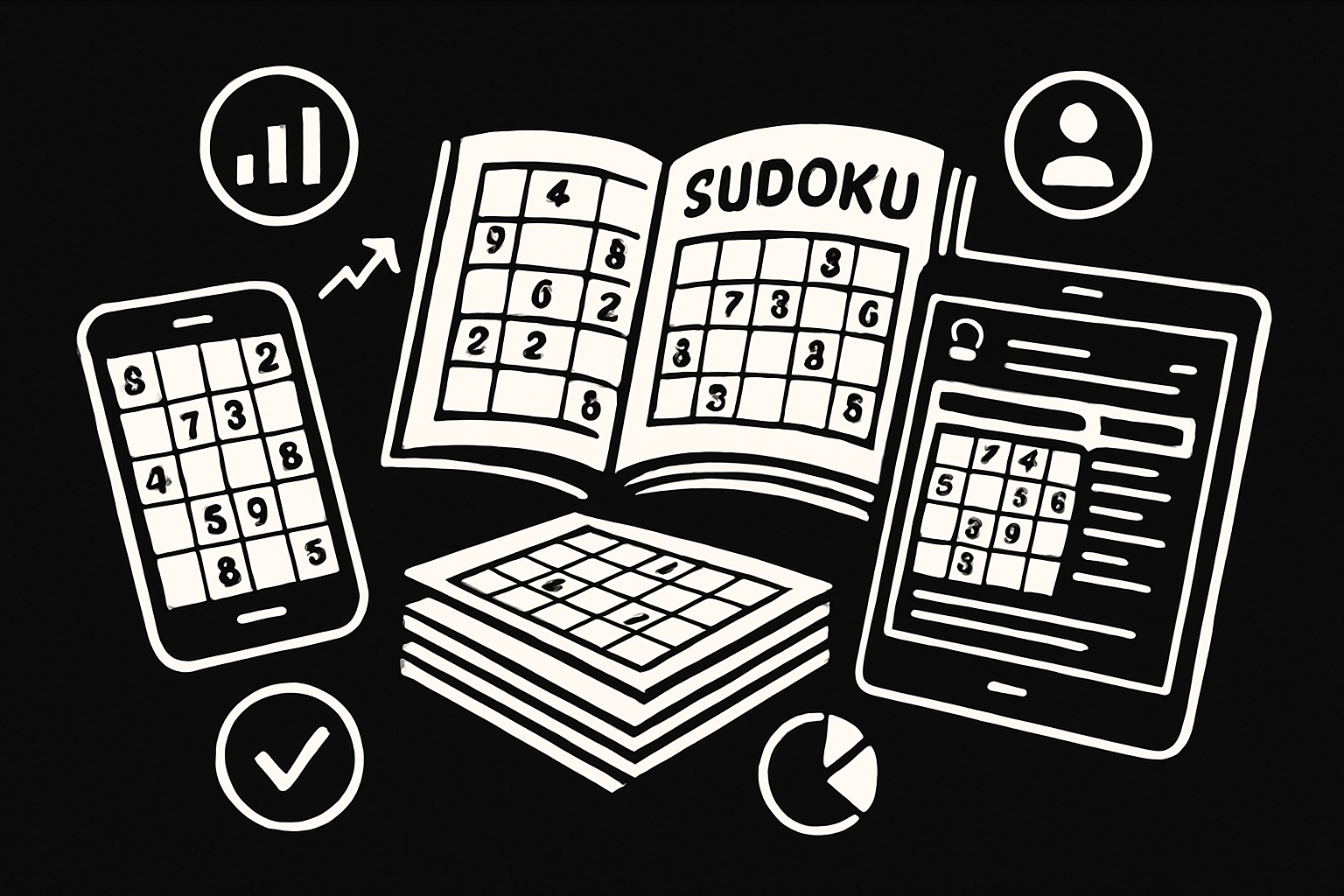
Must-Have Sudoku Apps and Online Platforms
For anyone aspiring to become a sudoku expert, apps and online platforms are essential. Top-rated Sudoku apps in 2025 include features like intuitive user interfaces, adjustable grid sizes, and built-in hints. Many offer daily challenges, offline modes for travel, and even time-tracking to monitor your progress.
Here’s a quick comparison:
| App Name | Difficulty Range | Hints | Offline Mode | Analytics |
|---|---|---|---|---|
| Sudoku Pro | Easy–Expert | Yes | Yes | Yes |
| Logic Grid | Easy–Hard | Yes | No | No |
| Sudoku World | All Levels | Yes | Yes | Yes |
Selecting the right app helps you practice efficiently and makes your journey to sudoku expert status more enjoyable.
Sudoku Books and Puzzle Collections
Printed Sudoku books remain a favorite for focused practice. Bestsellers cater to every level, from beginner to sudoku expert, with graded difficulty and themed collections. Books are perfect for screen-free solving and are easy to carry on the go.
Did you know over 1.2 million Sudoku books are sold each year? Not only do they offer endless practice, but they also support memory and logic skills. For an in-depth look at how games like Sudoku boost your brain, check out How Strategy Games Like Sudoku Enhance Cognitive Abilities.
Printable and Customizable Sudoku Grids
Sometimes, the best way to sharpen your sudoku expert skills is with printable puzzles. Many websites provide free, downloadable grids in various difficulty levels. Customizable grids let you create your own challenges, tailoring the experience to your needs.
Printing puzzles is especially handy when you want to practice without distractions or share the fun with friends and family. It’s a timeless way to enjoy Sudoku and develop your skills at your own pace.
Community Forums and Social Groups
Learning from a vibrant community is a game changer for any sudoku expert. Online forums like the popular Reddit Sudoku community, with over 500,000 members, connect you to strategy discussions, puzzle sharing, and group challenges.
Joining these groups lets you ask questions, share solutions, and get feedback. It’s also a great way to stay motivated and discover new solving methods from players worldwide.
Tracking Progress and Analytics Tools
Tracking your progress is key to becoming a sudoku expert. Many apps and dedicated journals help monitor your improvement, recording solve times, accuracy, and streaks. Analytics tools provide insights into your strengths and areas for growth.
Data shows that players who consistently track their progress improve 30% faster. Celebrate your milestones and let these tools keep you accountable as you climb to sudoku expert status.
Advanced Sudoku Strategies: Expert Techniques Explained
Ready to level up and think like a sudoku expert? Here’s where the magic happens. Advanced strategies transform tricky puzzles into solvable challenges, helping you see patterns, make lightning-fast deductions, and solve even the toughest grids with confidence.
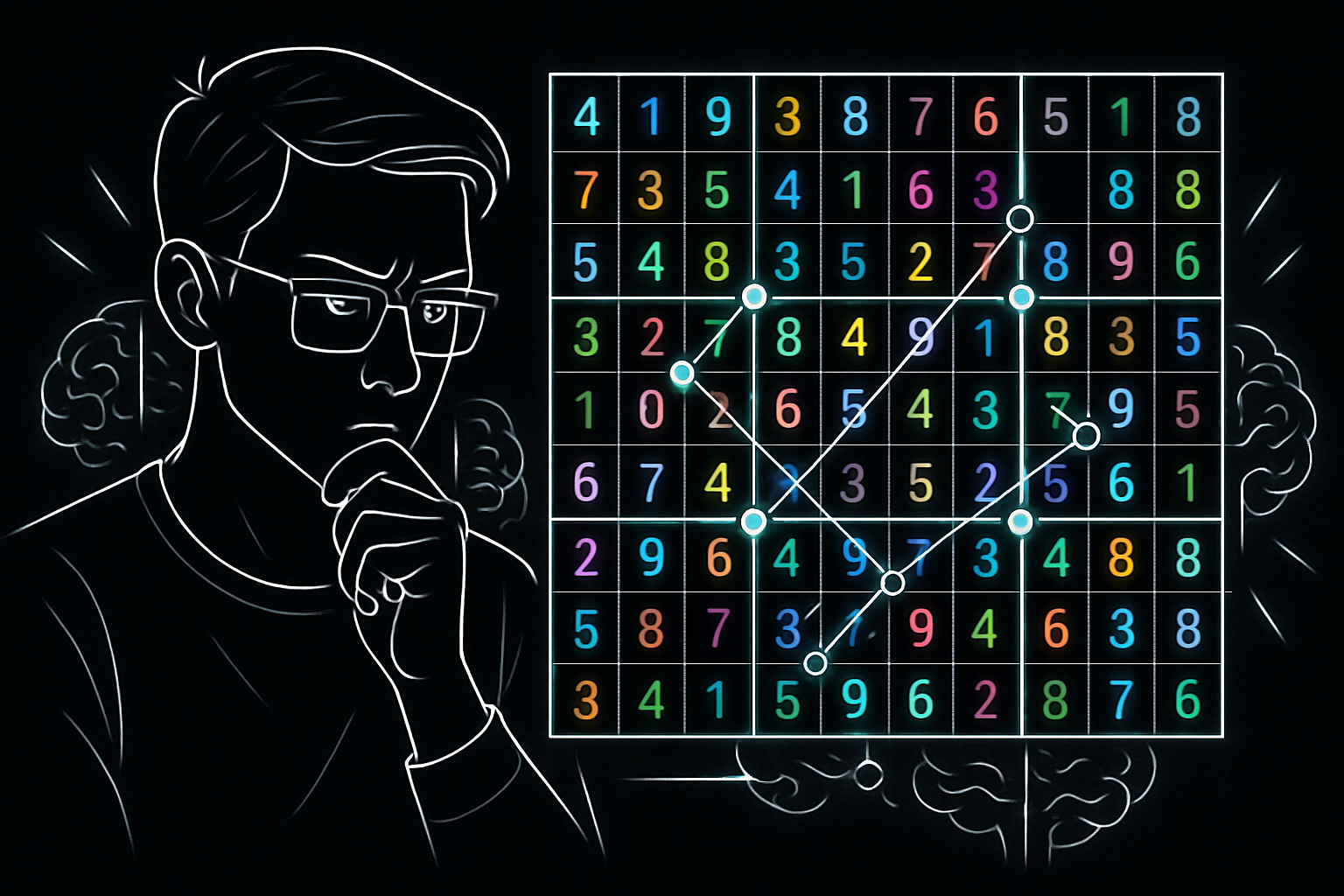
Pattern Recognition and Visualization
Pattern recognition is the cornerstone of becoming a sudoku expert. Instead of filling numbers blindly, you start to notice repeating structures and configurations within the grid.
Look for common patterns like X-Wing, Swordfish, and Jellyfish. These multi-row and multi-column arrangements can help eliminate possibilities in large sections of the puzzle. Visualization takes it a step further—imagine how placing a number will affect the rest of the board.
- Scan for identical candidate numbers aligned in rows or columns.
- Visualize chains of elimination before making a move.
- Use colored pens or digital highlights to track patterns.
The more you practice seeing these patterns, the more intuitive and efficient your solving becomes. This skill is what separates a casual player from a sudoku expert.
Chain Techniques and Forcing Chains
Chains are advanced deduction tools every sudoku expert should master. They involve linking candidates across cells to create a logical sequence—if one is true, another must be false, and so on.
Forcing chains are especially powerful in complex puzzles. They let you test hypothetical placements and trace the consequences, revealing hidden truths. This method is closely related to the logic behind neural networks, as explored in Solving Sudoku Using Oscillatory Neural Networks, where algorithms mimic expert-level deduction.
- Start a chain with a strong candidate.
- Follow the implications cell by cell, marking contradictions.
- Use chains to eliminate candidates or confirm placements.
With practice, you’ll spot opportunities for chains in almost every expert-level puzzle.
Coloring, XY-Wing, and Unique Rectangles
Coloring is a visual strategy for contradiction detection—a hallmark of a sudoku expert. Assign two colors to a pair of candidates that must be true or false. If a color causes a conflict, you know which candidate to eliminate.
The XY-Wing technique is another expert trick. It uses three cells that form a pivot and wings, letting you eliminate candidates from cells that see both wings.
Unique rectangles help prevent multiple solutions. If you spot four cells forming a rectangle with only two candidates, you can often remove one to maintain uniqueness.
- Apply two-color logic to chains for quick contradiction checks.
- Use XY-Wing to eliminate stubborn candidates.
- Scan for unique rectangles in nearly-solved grids.
Mastering these techniques will greatly expand your sudoku expert toolbox.
Time Management and Speed Solving
Expert sudoku isn’t just about accuracy—it’s about efficiency. Top solvers use time management strategies to tackle puzzles under pressure. Setting a timer and practicing speed drills can sharpen your reflexes and pattern recognition skills.
Many sudoku expert competitors use the following table to track their progress:
| Difficulty | Average Solve Time (Top 10%) |
|---|---|
| Easy | 2 minutes |
| Medium | 4 minutes |
| Hard | 7 minutes |
| Expert | <5 minutes |
To improve your speed:
- Warm up with easier puzzles before attempting expert grids.
- Use pencil marks to minimize hesitation.
- Practice focusing on one technique at a time.
With consistent effort, your sudoku expert speed will steadily climb.
Analyzing and Learning from Mistakes
Every sudoku expert knows that mistakes are inevitable—but each one is a learning opportunity. After solving a puzzle, review your steps and identify where things went wrong.
- Did you overlook a pattern?
- Was your notation clear and consistent?
- Did you rush through a deduction?
Keep a journal of tough puzzles and errors. Over time, you’ll spot recurring themes and develop strategies to avoid them. The best sudoku expert solvers embrace mistakes, using them to fuel continuous improvement and long-term mastery.
Common Mistakes and How to Avoid Them
Everyone aiming to become a sudoku expert faces common pitfalls. Mastering the game is about more than logic—it’s about recognizing and correcting these errors. Let’s break down the mistakes that hold players back and how to sidestep them.
Overlooking Simple Logic
One of the most frequent errors is missing straightforward placements. Even sudoku expert hopefuls sometimes forget to check every row, column, and box.
- Skipping a single square can halt progress.
- Overlooking an obvious number often leads to unnecessary confusion.
- Double-checking each area before moving on is crucial.
Slow down and scan each section systematically. This habit ensures you don’t miss the number that could unlock the entire puzzle.
Guessing vs. Logical Deduction
Relying on guesses is tempting, but it’s a trap that can derail your journey to becoming a sudoku expert. Guessing often leads to contradictions and more mistakes.
- Always exhaust logical options before considering a guess.
- Use deduction to narrow possibilities.
- Save guesses for when every other method fails.
Experts recommend sticking to logic, as it builds stronger skills and confidence over time.
Poor Notation and Organization
Failing to use pencil marks or notes effectively makes puzzles harder than they need to be. A true sudoku expert uses organized notation to track possibilities.
- Mark candidates in empty cells.
- Update notes as you solve.
- Keep your grid tidy for easy review.
Studies show organized notation reduces placement errors by up to 40%. Clear notes help you spot opportunities and avoid repeating mistakes.
Rushing and Lack of Patience
Speed can be exciting, but rushing leads to errors. Even a sudoku expert knows that patience is key for accuracy.
- Take your time with each move.
- Avoid skipping steps to finish faster.
- Pause and review your progress regularly.
Solvers who slow down and stay methodical make fewer mistakes and complete puzzles more reliably.
Ignoring Advanced Techniques
Sticking to basic strategies on tough puzzles limits your growth as a sudoku expert. Advanced techniques unlock solutions that simple logic can’t reach.
- Learn new methods like X-Wing or Swordfish.
- Practice advanced techniques on challenging puzzles.
- Don’t be afraid to step outside your comfort zone.
Continuous learning is what separates beginners from experts.
Not Reviewing Completed Puzzles
Many players finish a puzzle and move on, missing a key learning opportunity. A sudoku expert always reviews their work to spot patterns and errors.
- Check for mistakes after solving.
- Analyze where you struggled.
- Join online communities, like Reddit Sudoku, to share and discuss solutions.
Reflecting on your solves accelerates improvement and prepares you for more difficult challenges.
Staying Motivated: Building Your Sudoku Practice Routine
Building a sustainable Sudoku practice routine is the secret to growing from a casual player into a sudoku expert. Motivation can fluctuate, but a smart strategy ensures you keep improving—no matter where you start. Let’s break down how to keep your skills sharp and your enthusiasm high as you work toward sudoku expert status.
Setting Realistic Goals and Milestones
Every sudoku expert starts with small, achievable goals. Set daily, weekly, and monthly targets that fit your lifestyle. For example, aim to solve one easy puzzle each morning, then gradually increase to tackling expert-level grids.
Use a journal or app to track your progress. Celebrate milestones, such as your first completed hard puzzle. These wins keep you engaged and make the journey to becoming a sudoku expert both rewarding and measurable.
Incorporating Sudoku into Daily Life
Consistency is key for any sudoku expert. Incorporate short Sudoku sessions into your routine—perhaps during a lunch break or as a relaxing evening ritual. Studies show that 20 minutes a day improves retention and sharpens logic skills.
Try keeping a Sudoku book in your bag or using a mobile app for quick practice on the go. Little bursts of regular practice add up, helping you develop the habits of a true sudoku expert.
Joining Challenges and Competitions
Taking part in Sudoku challenges and competitions adds excitement and structure to your practice. Whether you join local tournaments or global online events, competing against others can boost motivation and accelerate your growth.
Look for monthly challenges on Sudoku apps or join annual world competitions. Friendly rivalry and the thrill of timed puzzles push you to think faster and stay focused. Sharing results with peers keeps the experience social and fun.
Tracking Progress and Celebrating Wins
A sudoku expert knows the value of monitoring improvement. Use apps or handwritten journals to log solved puzzles, track solving times, and note which techniques you’ve mastered.
Marking your achievements—like solving your first expert puzzle or beating your previous best time—fuels your motivation. Reflecting on your journey helps you see just how far you’ve come and encourages you to keep reaching for new heights.
Learning from the Sudoku Community
Connecting with other enthusiasts is a game-changer on your path to becoming a sudoku expert. Join forums, webinars, or group-solving sessions to swap tips, share puzzles, and ask questions.
Communities like the Reddit Sudoku board offer support and fresh perspectives. Learning from others’ experiences can spark new insights and help you overcome tricky puzzles with confidence.
Overcoming Plateaus and Staying Inspired
Even the most dedicated sudoku expert hits a plateau now and then. When progress stalls, mix things up: try new puzzle types, tackle harder grids, or revisit older puzzles to spot patterns you missed.
Stay inspired by reading success stories, setting new challenges, or teaching a friend how to play. Remember, every sudoku expert faces setbacks—what matters is your commitment to keep learning and enjoying the journey.
Now that you’ve got the inside scoop on mastering Sudoku—from understanding the basics to cracking those expert-level puzzles—why not put your new skills to the test? The best way to improve is by practicing regularly, and there’s no better place to dive in than right here. Whether you’re just starting or aiming for expert status, you’ll find puzzles suited to every level. Ready to challenge yourself and see real progress? Let’s keep the momentum going—Play Sudoku Online!

